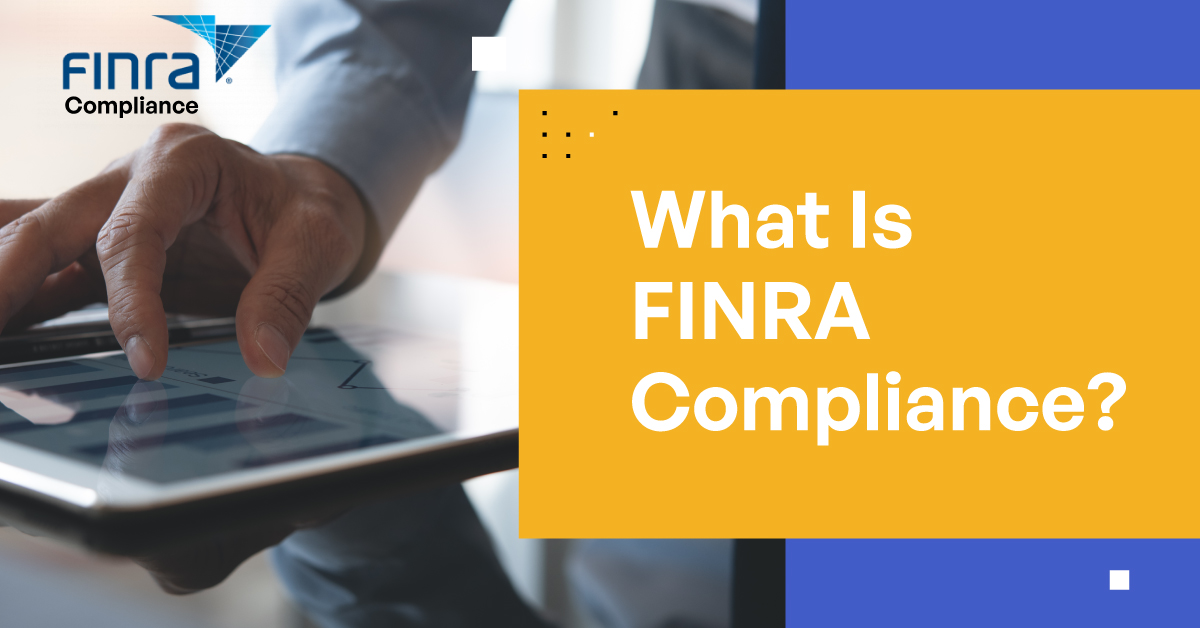What Is FINRA Compliance?
FINRA (Financial Industry Regulatory Authority) is the compliance regulation process of ensuring that financial firms comply with best practices and standards. FINRA enforces its rules to ensure that investors have access to fair and honest services and products, while also protecting them from fraud, manipulation, or abuse.

FINRA compliance covers a wide range of activities and regulations that must be followed by all financial firms and brokers, including fair trade practices, advertising standards, and market conduct. Financial firms must register with FINRA before they can transact with the public, and all transactions must comply with FINRA regulations. FINRA also requires firms to file periodic reports, showing their compliance with the required rules and regulations. For financial firms, this dictates that they have cybersecurity risk management strategies in place.
FINRA requires firms to supervise their staff, submit periodic financial reports, and adhere to all anti-money laundering laws. The FINRA Compliance Program is designed to help firms protect the interests of the public, keep pace with the changing financial market, and remain compliant with FINRA rules. Firms must dedicate resources to ensure regulatory compliance, and failure to do so could lead to significant fines and other penalties. FINRA reviews firms to ensure their financial services are in compliance with applicable laws and regulations.
A FINRA Compliance Program is critical for protecting customers and investors in the financial industry. Without these regulations, investors would be exposed to unnecessary risks, and the industry would become an open market of unethical practices. FINRA works to ensure that all financial firms and brokers are operating fairly and legally and to promote a fair and open market for everyone.
Why Is FINRA Compliance Important?
FINRA compliance is important for firms, financial advisors, and individual investors for a variety of different reasons. First and foremost, it ensures that financial advisors are providing their clients with the highest quality of financial advice and services.
FINRA compliance is highly important for protecting investors’ financial interests. By ensuring adherence to FINRA rules, investors can be sure that the advice they receive is in their best interests. Additionally, FINRA compliance helps to ensure that firms take all necessary steps to protect their clients’ assets and investments. This includes reporting requirements, cybersecurity risk management policies, and other measures such as portfolio diversification.
Moreover, FINRA compliance is essential for avoiding legal and financial repercussions for firms and their employees. By ensuring all laws and regulations are followed, firms can avoid costly fines and penalties. Further, they can protect their employees from legal action should the financial advice provided be deemed unsuitable or improper. This can help to ensure that firms and their employees are in compliance with all applicable laws and regulations.
By adhering to FINRA rules and regulations, firms are able to demonstrate that they are providing their clients with the highest quality of financial advice and services. A FINRA Compliance Program helps to protect investors’ financial interests, while also helping to protect firms and their employees from legal and financial repercussions. In event of a cyberattack and data breach, significant costs can occur—financial, legal, operational, and compliance.
Key FINRA Compliance Rules
FINRA has created a complex set of rules and regulations that must be followed by firms and individuals in the securities industry. These rules are designed to protect investors, promote fair practices, and ensure that firms and individuals are meeting the highest standards of conduct. It is important for firms and individuals to understand and adhere to the FINRA requirements in order to ensure that they remain in compliance.
Registration and Licensing Requirements
FINRA is the industry-funded body that is responsible for regulating broker-dealers and the securities industry. To protect investors, FINRA has created a set of rules that must be adhered to by firms and individuals who deal in securities. These rules include registration and licensing requirements for all individuals who work with securities. All firms must be registered with FINRA, which requires that they complete extensive registration forms and provide detailed financial information. Additionally, individuals who work with securities must be licensed with FINRA and pass a Series 7 exam.
Advertising and Communication Rules
FINRA also governs the advertising and communication activities of firms and individuals in the securities industry. The advertising and communication rules are designed to prohibit firms and individuals from making false or misleading statements in connection to the sale or promotion of securities or other investments. In addition, the rules also govern how firms and individuals should present any potential conflicts of interest when dealing with investors.
Anti-money Laundering (AML) Regulations
FINRA also has strict anti-money laundering (AML) regulations that require firms and individuals to take steps to ensure that all customer transactions are legitimate and that customers are not engaging in any illegal activity. These regulations require firms and individuals to monitor customer accounts and report any suspicious activity to the appropriate authorities.
Record-keeping Requirements
FINRA has strict record-keeping requirements that must be adhered to by firms and individuals in the securities industry. These requirements include the preservation of customer records, transaction records, and other financial information. Firms and individuals must also keep all customer information secure and confidential.
Supervision and Reporting Rules
FINRA also mandates that firms and individuals have robust internal systems to supervise and monitor the activities of their customers. In addition, the rules require firms and individuals to report any suspicious activity, market manipulation, or insider trading to regulatory authorities.
Common FINRA Compliance Issues
FINRA compliance issues are extremely important and firms must adhere to all the regulations in order to avoid any legal or regulatory issues. An understanding of the most common FINRA compliance issues is essential for all firms in order to ensure they remain compliant with the regulations. When it comes to sensitive content communications across different channels—email, file sharing, managed file transfer, web forms, and application programming interfaces (APIs)—such requires significant governance tracking and controls.
Failing to Disclose Conflicts of Interest
A conflict of interest occurs when a broker or firm has competing interests that may potentially interfere with their fiduciary duty to their client. This could include a situation where a firm or broker has a personal financial interest in a transaction. For instance, if a broker personally owns a security that the firm recommends, then this could be deemed a conflict of interest. Firms must always disclose any conflicts of interest before a transaction takes place in order to avoid any legal or regulatory issues.
Failing to Supervise Employees Adequately
Firms must supervise their registered representatives in order to ensure they are complying with FINRA regulations. This requires firms to properly train their representatives, review their activity on a regular basis, and ensure they have a complete understanding of their regulatory obligations. Firms must also ensure that any complaints or inquiries are addressed promptly and that representatives adhere to FINRA’s Code of Conduct. Part of this process includes tracking and controls over private data governance—who accesses content, who can edit it, to whom it can be sent and shared, and where it can be shared and sent.
Failing to Maintain Accurate and Complete Records
FINRA requires firms to keep accurate and complete records of all their activities. These records include account activity, client communications, sales activity, and other information related to their business. Firms must also ensure that their records are accessible to FINRA upon request. This allows FINRA to review the data and ensure that firms are compliant with the regulations.
Failing to Report Suspicious Activity
FINRA requires firms to report any suspicious activity to the appropriate regulatory body in a timely manner. This includes any activity that could potentially be fraudulent or violate any securities laws. This includes such activities as insider trading, money laundering, or market manipulation. Firms must also be able to provide documentation or proof of any suspicious activity they have reported.
Best Practices for Achieving FINRA Compliance
Achieving and maintaining FINRA compliance is critical for any financial firm. To ensure compliance with FINRA regulations, firms need to implement and following a few best practices can help ensure continued compliance. The following best practices will help organizations meet FINRA’s standards and protect their customers from risks:
Conduct Regular Compliance Training for Employees
A key element of maintaining FINRA compliance is ensuring that staff members have regular training and knowledge of the regulations and laws. To accomplish this, firms should establish a comprehensive training program that is regularly reviewed and updated. The program should include initial training upon hire, refresher training every two years, and supplemental training in the form of one-on-one mentoring or job shadowing as necessary. The program should focus on the areas that are most relevant to the firm’s business, as well as areas of potential risk or exposure.
Establish Effective Compliance Policies and Procedures
To ensure FINRA compliance, firms should have detailed policies and procedures in place that are communicated to staff and regularly updated. These policies should cover topics such as best execution, client orders handling, customer profiling and suitability, market manipulation, and fair dealing with customers. In addition, firms should have a system in place for customer dispute resolution.
Maintain Accurate and Complete Records
FINRA requires firms to maintain records that demonstrate compliance with its regulations, including documents that relate to customer accounts, transactions, and customer funds. These records must be organized, clearly labeled, and kept for at least three years. In addition, firms should have processes in place for reconciling accounts and reviewing customer complaints.
Conduct Regular Internal Audits and Reviews
FINRA requires firms to conduct regular internal audits and reviews to ensure continued compliance. This should include reviews of customer accounts, customer orders, and customer funds. The firm should also have procedures in place to identify and report suspicious activities. In addition, the firm should have a policy in place for addressing any violations of FINRA regulations and reporting them to FINRA. Here, firms need to generate audit trails that provide comprehensive reports around governance tracking and controls for sensitive content communications.
What Is the Difference Between FINRA and the SEC?
The Financial Industry Regulatory Authority (FINRA) and the Securities and Exchange Commission (SEC) are two agencies with seemingly similar responsibilities. FINRA is a self-regulatory organization tasked with overseeing most broker-dealer activities, while the SEC is a government agency responsible for regulating the securities markets and protecting investors.
The primary difference between FINRA and the SEC is that FINRA is an independent, not-for-profit organization overseen by the SEC, whereas the SEC is a government agency. As the self-regulatory body for U.S. broker-dealers, FINRA monitors and enforces compliance with the securities laws and regulations approved by the SEC. Specifically, FINRA is responsible for enforcing rules governing the day-to-day operations of registered broker-dealers, including advertising requirements, stock market trading, and customer account activities.
Employ Private Content Governance With Kiteworks for FINRA
The Kiteworks Private Content Network unifies, tracks, controls, and secures sensitive content communications across all different channels. Kiteworks embraces a content-defined zero-trust approach that utilizes least-privilege access and always-on monitoring. It also employs policy-driven governance that helps organizations meet regulatory compliance directives like FINRA.
Schedule a custom demo to see how Kiteworks can enable your organization to protect sensitive content communications and help you comply with FINRA and other industry regulations.

